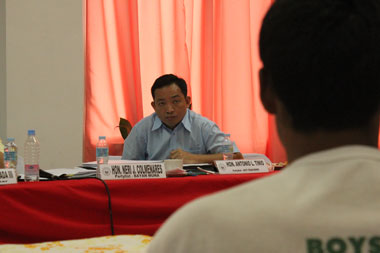
FILE PHOTO (davaotoday.com photo by Medel V. Hernani)
DAVAO CITY, Philippines—The government’s Conditional Cash Transfer program has not improved the enrolment rate in both elementary and secondary schools despite the increase of budget it received from 2011 to 2015.
ACT Teachers Representatives Antonio Tinio and France Castro, in a statement over the weekend, said they saw “no significant impact from the Conditional Cash Transfer program in improving enrollment and completion rates in elementary and secondary schools.”
The participation or net enrollment rate for public and private schools went down by 6.05 percentage points from 97.10 percent (14.44 million out of 14.87 million elementary school-age children) in 2011 to 91.05 percent (14.35 million out of 15.76 million) in 2015, according to Castro, citing a data from the Department of Education.
While elementary school-age children not enrolled in Grades 1 to 6 more than tripled from around 431,000 in 2011 to 1.41 million 2015, she said.
“We have observed little improvement, even decreases in the enrollment and completion rates from 2011 to 2015. This is despite the hefty increases in the budget for the Conditional Cash Transfer,” Castro said.
Castro, however, pointed out that though high school NER increased from 64.2 percent (7.05 million out of 10.98 million high school-age youth) to 68.15 percent (7.35 million out of 10.79 million), the number of high school-age youth not enrolled in first to fourth year remain high with 3.44 million in 2015.
The lawmakers said the CCT also “did little to improve the high school completion rate.”
While elementary school completion rate rose from 71.01 percent (10.25 million) to 84.02 percent (12.05 million), fewer youths finished high school, with the completion rate declining from 74.4 percent (5.25 million, or 1.8 million dropouts) in 2011 to 74.03 percent (5.44 million, or 1.9 million dropouts) in 2015.
“The wide gaps or differences between the enrollment figures for elementary and those for high school also indicate that a significant number of those in elementary school do not go on to enroll and finish high school,” the lawmakers noted.
Saying the CCT program was a failure, ACT’s Tinio said “the government should directly fund basic social services like education, health, and housing that would directly help the poor and marginalized.”
“Direct investments in public education, for instance, will enable more Filipino youth to avail of and complete free education, ” Tinio added. “Stop wasting the people’s money in safety nets that have been proven to be ineffective.”
The 4Ps gives a grant of P300 per child every month for 10 months, or a total of P3,000 every year, with a maximum of three children per household. Children-beneficiaries aged 3 to 18 must enroll in school, and attend classes at least 85 percent of class days every month.
It can be recalled that the Aquino administration expanded the CCT program, increasing nearly three times its budget from P21.2 billion in 2011 to P62.7 billion in 2016. It was given P62.3 billion in 2015.
Under the Duterte administration, the CCT program now has a budget of nearly P78.19 billion according to the 2017 General Appropriations Act.
“The little to no improvement in enrollment and completion rates in elementary and secondary schools reflects on the capacity of government to provide universal access to basic education. There are still a lot of shortages in public school education that have to be addressed like the lack of public high schools especially in rural areas, the low salaries that teachers and school staff receive, and lack in facilities especially in the proper implementation of the K to 12,” Tinio said.(davaotoday.com)
ACT, Antonio Tinio, CCT, DepEd, teachers









